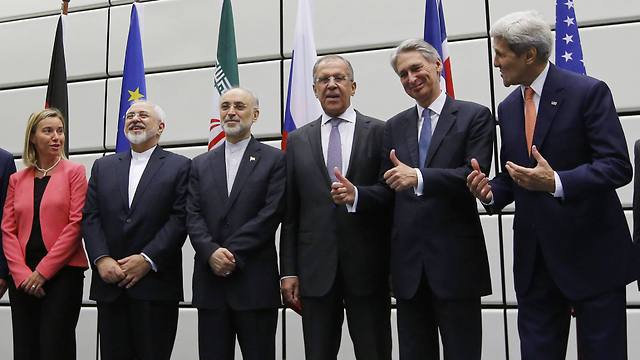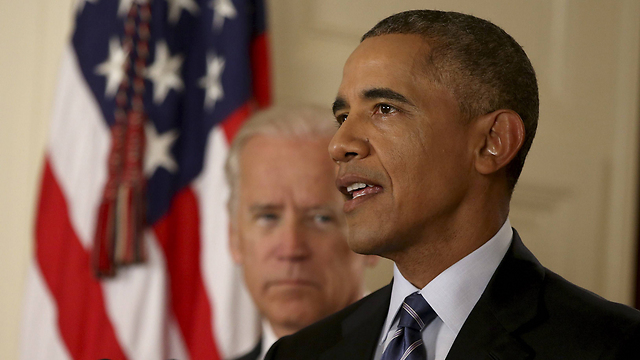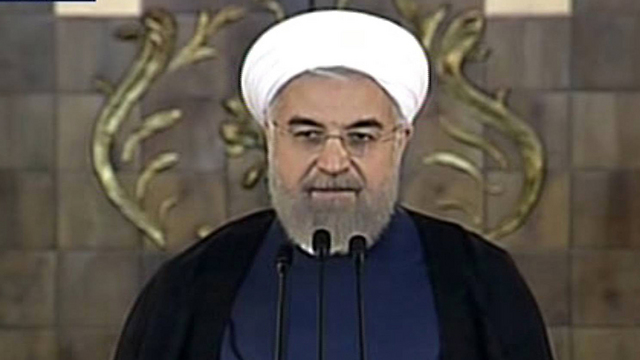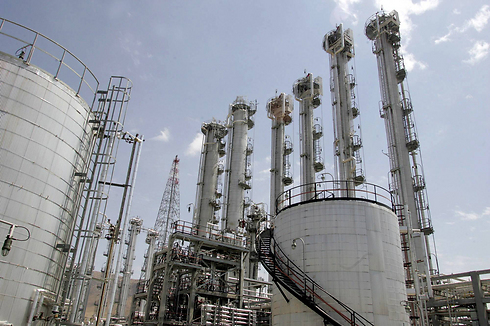Analysis: The Vienna agreement does delay Iran’s construction of a bomb by a year or more, but if Iran chooses to violate the deal, it could get the bomb within a few weeks; Israel must prepare for a potential pre-emptive strike on Iran’s nuclear facilities and on Hezbollah.
At the end of the day, the success of the agreement signed on Tuesday in Vienna depends on the goodwill of the Iranian leadership, which is notoriously untrustworthy. Israel should therefore take the necessary precautions and prepare for an Iranian violation of the agreement.
The historic agreement signed in Vienna Tuesday is a diplomatic masterpiece. In its essence, the text doesn’t prevent Iran from going nuclear, but does insure that it won’t achieve such abilities in the immediate future – that is, not during the tenure of President Barack Obama and the other world leaders involved in the agreement.
Obama faces two difficult months ahead during which time he will need to convince the members of both houses of Congress to approve the agreement, including the lifting of sanctions on Iran. He may have to veto an opposition decision by the Republican majority in the House and find ways to please the many Democrats who do not support the deal.

But the American president will have his way in the end. This will be his greatest legacy in the realm of foreign policy, an agreement that turns the page on US-Iran relations and postpones a nuclear Middle East for a few years.
From Israel’s point of view, the agreement puts the military option back on the table and increases its urgency. The Israeli government will now have to decide whether or not to attack Iran if and when the ayatollahs decide to make a break for a nuclear weapon.
But Obama can comfortably say, without fear of being disproved, that the Vienna agreement does realistically delay Iran’s construction of the bomb by a year or more – just as promised. Obama and the other world powers can also brag that means of inspection agreed upon allow for strict oversight of uranium production and if Iran breaks the rules, they will be able to renew sanctions.

Similarly, it can also be said that before the agreement expires and while sanctions are lifted, Iran will open up to the West and maybe the regime will change its nature and give up its desire to command a nuclear arsenal. Obama repeatedly made concessions, but at least he got something in return.
World champions of fraud
On the other hand, Prime Minister Benjamin Netanyahu is completely correct in saying that the Vienna agreement doesn’t prevent Iran from developing and producing a nuclear weapon. The deal only delays the process, in the best of circumstances for 10 years or more, in the worst of circumstance for one or two years.
The date that will determine everything is the day sanctions on Iran will be lifted in their entirety (in 2016) plus another two years. After a period of time, it probably won’t be realistic or possible to consolidate an international consensus to renew the sanctions or for the Americans to act militarily if Iran breaks the rules. Iran’s leadership will be free to either stick to the agreement or break it either openly or secretly. Rouhani and the Revolutionary Guards will decide which path to take.

It should be remembered that the Iranians are world champions of fraud. They acquired invaluable experience in the field over the last decade. Until the West deliberates and decides what to do, the ayatollahs will already have the knowledge and quick, modern infrastructure to enrich uranium as well as an ability to produce a minimized war head to be mounted on a rocket. Under these conditions, the road to a nuclear weapon is only a matter of a few months.
Even if the next US presidents remained determined and united with other world powers to limit Iran’s nuclear capabilities in 10-15 years’ time, they will have a difficult time doing so in practice. Until everyone recognizes that Iran definitely decided to make a break for the weapon, and until they decide what to do, even a US military strike will be too little too late. And that’s in the best case scenario that Iran follows the rules they signed off on in the agreement.
Only one year to a bomb
Already today, Iran is a threshold state, capable of enriching uranium to the level required for developing a warhead two-three months down the line. But its military program is not as advanced – nobody in the West is able to say with certainty how long Iran would need to develop an operational nuclear warhead; the estimate is that they would need another few months. So, realistically, Iran is a year away from the bomb.
The agreement’s greatest achievement is that it keeps the breakout time at that. In terms of uranium enrichment, it even puts further obstacles, because it requires Iran to dismantle most of the centrifuges in its possession and drastically reduce the reserve of enriched uranium it currently holds (which is sufficient for six-eight bombs). Also, Iran will be prevented altogether from enriching plutonium to levels required for military use.
This is Obama’s main achievement. No less important, Secretary of State John Kerry conditioned the removal of the sanctions upon the reduction of Iran’s enrichment capabilities. In other words, the sanctions will not be fully removed until Tehran proves, upfront, that the conditions were fully met.
But what if Iran violates the deal?
But there remains a huge loophole that beckons the Iranians to cheat. Even though it would be a violation of the agreement, Iran is perfectly able to develop new models of centrifuges that could enrich uranium at a pace that is three to eight times greater than the old ones. Essentially, were Iran to choose not to abide by the deal, it would be able to get the bomb within a few weeks.

But the biggest loophole of all is IAEA’s limited ability to monitor and inspect violations of the restrictions on manufacturing the weapons themselves. Even though the inspection clauses are draconian, Iran can engage in foot-dragging that would simply stymie them.
As to ballistics, the Vienna agreement leaves many loose ends. In practice, Iran can continue to develop ballistic missiles, cruise missiles and multiple re-entry missiles that, further down the line, will be able to carry nuclear warheads.
Free to buy and sell weapons
Other clauses that aren’t directly connected to Iran’s nuclear capability are also hardly encouraging, like its renewed ability to sponsor terror and insurgency across the Middle East. The powers conceded to Iran’s demand to alleviate the UN Security Council prohibition on buying and selling conventional weapons. It will be only two years down the line but, eventually, Iran will be able not only to arm Syrian President Bashar Assad, but also to purchase air defense systems to protect their nuclear facilities.
In addition, the removal of the sanctions will bring Iran billions of dollars in revenue as early as 2016 – a sum big enough not only to stabilize its failing economy, keep the Revolutionary Guards at bay and perpetuate the Islamic regime (against the wishes of the West), but also to fund terror and press on with their aspirations for regional hegemony. This is a grave concern not only for Israel, but for Saudi Arabia, Egypt and Jordan, too.
A gentlemen’s agreement?
Could a better agreement have been achieved? Possibly. But the problem with the Vienna accord, just like other treaties to curb nuclear proliferation, is that it depends, at the end of the day, on the goodwill of the Iranian leadership and, even more so, on the deterrence power of the West.
The agreement is based on trust. The Western powers believe that if Iran signed the deal it will either abide by it or openly declare it void. That’s not the way of the Middle East. It proved ineffectual vis-à-vis North Korea as well. True, the Iranian regime is more sensitive to sanctions, but once they’ve been removed it will be ten times more difficult to renew them.
Would no deal have been better? It wouldn’t have worked either. The sanctions would have remained in place, but Iran would have still been able to accumulate uranium, develop new centrifuges and build warheads, and break out the minute Khamenei had put his mind to it. The agreement, thus, is the lesser of two evils: At the very least, it delays Iran’s nuclear armament by a few years – and that, it should be noted, is exactly what Israel wanted to achieve a few years ago by launching a military strike.
Therefore, there’s no use crying over spilled milk and pointing fingers. What we need now is a clear operative plan that takes into account the possibility that Iran hasn’t given up on trying to get the bomb. That’s why we need to keep the pressure on Iran, and opt for a military strike if Iran goes nuclear; and if one day it comes to pass that Iran has a nuclear arsenal, Israel would have to create an effective deterrence and abandon its long-held nuclear ambiguity policy.
To this end, Israel will need to do the following:
- Improve the relationships with the Obama administration and other Western governments. Netanyahu’s rallying with the Republicans in Congress won’t hinder the implementation of the agreement, and will only abet the hostility of the White House. Israel has no time to wait until Obama stands down;
- Reach understandings with the American administration about what counts as violations of the deal, and what sanctions it would entail;
- Beef up intelligence gathering on Iran to minimize the risk of a strategic surprise;
- Improve Israel’s defense against missiles, as well as aerial and naval attacks;
- Prepare for a potential pre-emptive strike on Iran’s nuclear facilities and on Hezbollah and save it for when it is clear without a shadow of a doubt that Iran is moving towards getting the bomb. Hezbollah will need to be attacked at the same time because it’s clear that it will take a proactive role in any conflict between Israel and Iran.
As reported by Ynetnews
